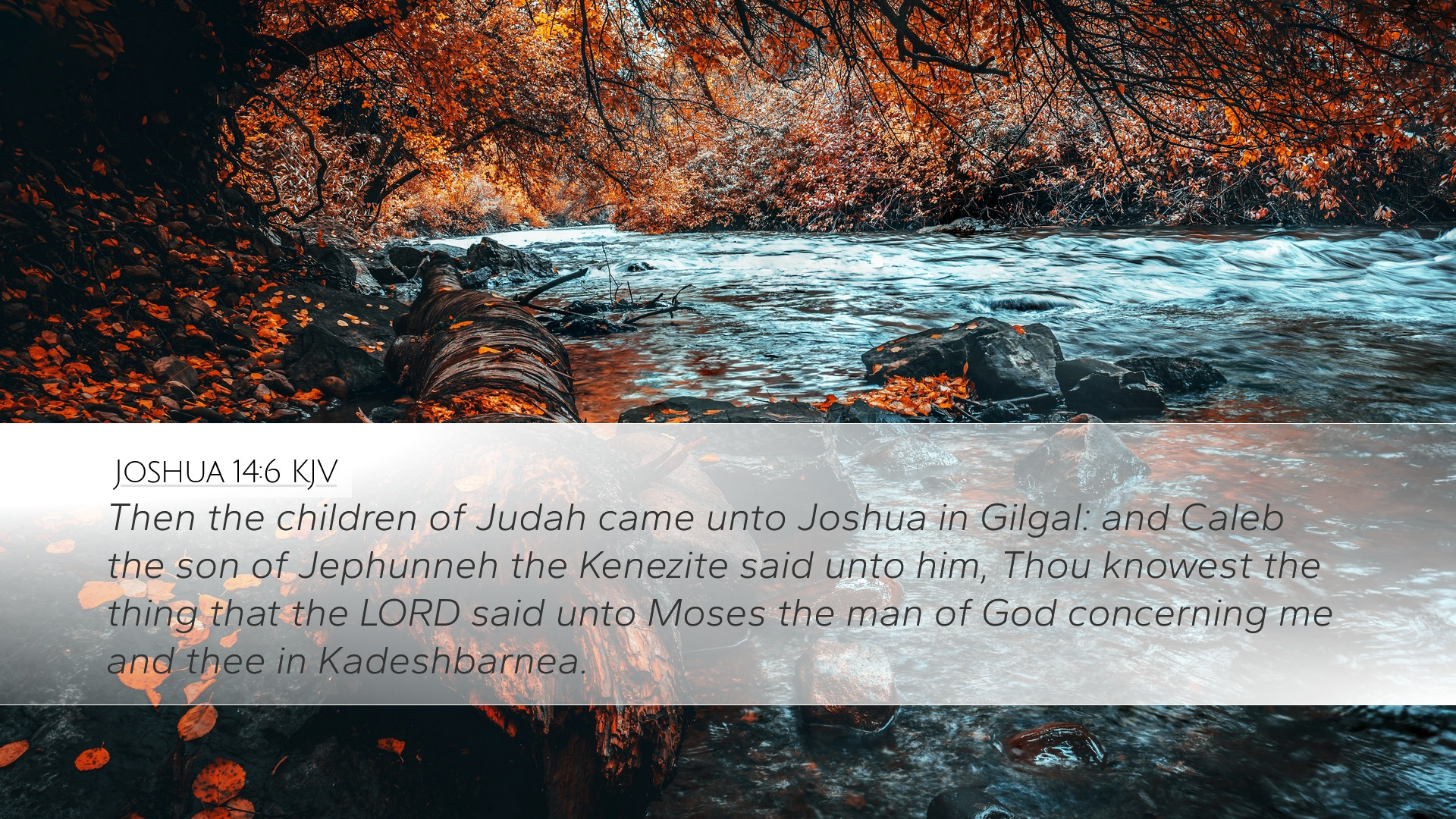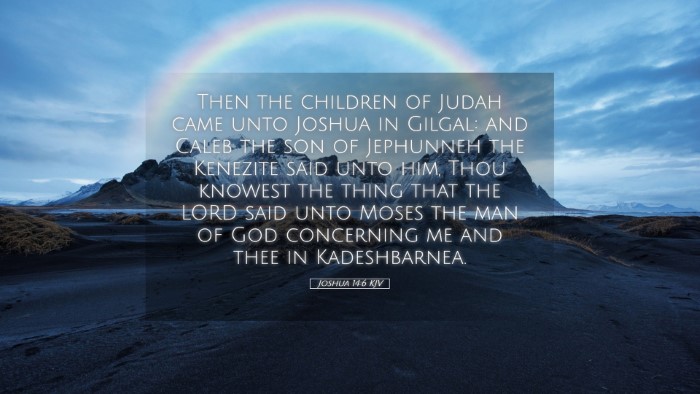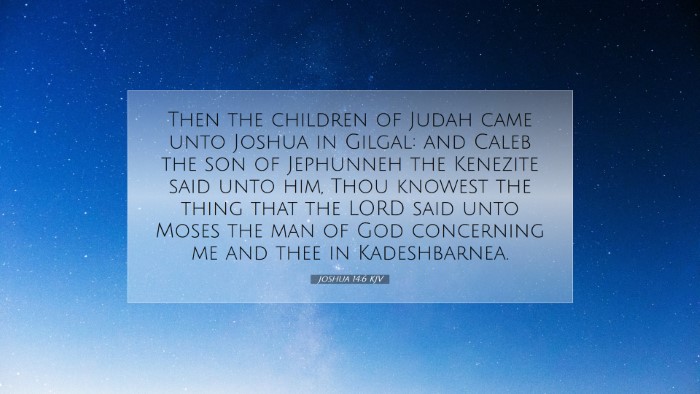Old Testament
Genesis Exodus Leviticus Numbers Deuteronomy Joshua Judges Ruth 1 Samuel 2 Samuel 1 Kings 2 Kings 1 Chronicles 2 Chronicles Ezra Nehemiah Esther Job Psalms Proverbs Ecclesiastes Song of Solomon Isaiah Jeremiah Lamentations Ezekiel Daniel Hosea Joel Amos Obadiah Jonah Micah Nahum Habakkuk Zephaniah Haggai Zechariah MalachiJoshua 14:6
Joshua 14:6 KJV
Then the children of Judah came unto Joshua in Gilgal: and Caleb the son of Jephunneh the Kenezite said unto him, Thou knowest the thing that the LORD said unto Moses the man of God concerning me and thee in Kadeshbarnea.
Joshua 14:6 Bible Commentary
Commentary on Joshua 14:6
Verse Overview: Joshua 14:6 reads: "Then the children of Judah came unto Joshua in Gilgal: and Caleb the son of Jephunneh the Kenizzite said unto him, Thou knowest the thing that the LORD said unto Moses the man of God concerning me and thee in Kadesh-barnea." This verse introduces the significant request of Caleb, a key figure in the Israelite conquest of Canaan.
Contextual Background
The Historical Setting: This passage occurs after the Israelites entered the Promised Land. Joshua, now leading the people, divides the land among the tribes. Caleb approaches Joshua to remind him of God's promises made through Moses regarding the land that was promised to him.
Key Insights from Public Domain Commentaries
Matthew Henry’s Commentary
Matthew Henry highlights the boldness of Caleb as he comes to Joshua. Despite being one of the older generation, Caleb’s spirit remains indomitable. He recalls the promise made by God and emphasizes the importance of remembering divine commitments. Henry points out that Caleb demonstrates a strong confidence in the promise of God, showcasing what true faith should look like.
- Faithful Remembrance: Caleb's recollection of past events emphasizes the significance of memory in faith. He urges Joshua to reflect on the divine word spoken in Kadesh-barnea.
- Inheritance and Promise: Caleb's request for his inheritance is not just about land; it symbolizes the faithfulness of God. His claim to Hebron reflects the depth of his trust in God's promise.
Albert Barnes’ Notes on the Bible
Albert Barnes provides a nuanced exploration of Caleb’s character. He underscores Caleb's unwavering faith amidst adversity, contrasting him with the disbelief of his peers. Caleb's boldness in claiming what was rightfully his serves as an example for contemporary believers.
- The Strength of Caleb: At eighty-five, Caleb stands as a testament to enduring faith and vitality. His physical vigor symbolizes spiritual vitality rooted in God’s promise.
- The Nature of Courage: Caleb’s approach to Joshua is marked by respect yet assertiveness. He requests what he believes is his due not in arrogance but in acknowledgment of God’s promise.
Adam Clarke’s Commentary
Adam Clarke delves into the geographical importance of Hebron, the land Caleb desired. He notes that Hebron was a place of significant biblical history, being associated with Abraham. Clarke suggests that for Caleb, claiming Hebron was not merely about territory, but also about legacy and faithfulness to God’s covenant.
- Historical and Spiritual Significance: Clarke points out that Hebron was the burial site of the patriarchs, reinforcing the spiritual heritage connected to this land.
- Covenantal Faith: Caleb’s attitude reflects a deep-seated belief in God’s faithfulness, reminding believers to seek God’s promises with tenacity.
Theological Reflections
This verse prompts important theological reflections regarding faith and the nature of divine promises. Caleb is a model of how believers should respond to God’s promises with action and persistence.
- The Assurance of God’s Promises: The narrative illustrates that God is faithful even when circumstances appear dire. Caleb's request is a faith-driven act, reminding believers to trust in God's timing.
- Personal Agency in Faith: Caleb's determination teaches the importance of actively pursuing the promises of God. This highlights the balance between divine sovereignty and human responsibility.
Practical Applications
The insights drawn from Joshua 14:6 are not merely historical but serve to enrich contemporary faith practice.
- Model of Perseverance: Pastors and theologians can draw from Caleb’s example, encouraging congregations to hold onto God's promises with courage, even as they age.
- The Importance of Remembering God’s Works: Students and scholars are reminded of the importance of biblical history in understanding current faith practices.
- Legacy and Faith: This passage invites believers to consider what they inherit spiritually and how they might contribute to the faith legacy of their communities.
Conclusion
Joshua 14:6 is a profound reminder of God's faithfulness and the call for believers to act boldly in claiming their spiritual inheritances. The insights from Matthew Henry, Albert Barnes, and Adam Clarke coalesce to present a comprehensive understanding of Caleb's unwavering faith and the theological implications of his actions. As we reflect on this passage, let us be inspired by Caleb’s tenacity and drawn into a deeper trust in God’s promises.


